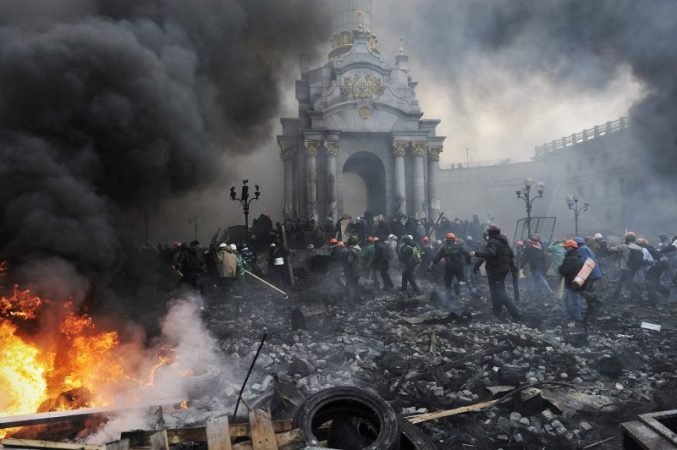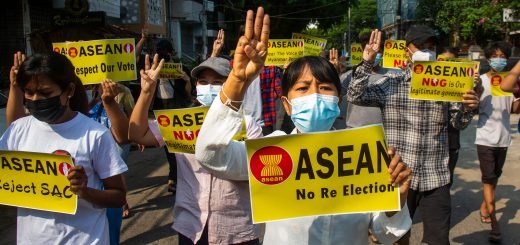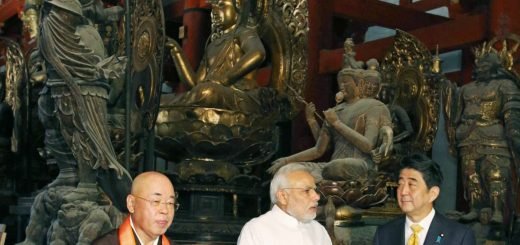The Role of West and Humanitarian Interventions in the Ukrainian Conflict

The civil war-like crisis have origins in the ethnic divisions within Ukraine. The orthodox minority in the east speaks Russian whereas the rest eastern Ukraine speaking populations see Europe as their closest neighbours. The geopolitical location of the country is strategic for both Europe and Russia. Therefore, it is constantly subjected to the “neighbourhood policies” from both sides leading to internationalization and externalization of the conflict.
The warlike representation is mostly owed to the externalization of the conflict by Russian propaganda and to some extent, NATO’s subsequent response to acts of aggression by Russia. Russian representation of minorities in Ukraine being subjected to historical subjugation and marginalization is false. Ukraine is essentially a bilingual country. The violent clashes are neither systematic nor widespread. The anxiety amongst the Russians speaking minority to ensure security over their freedom was what made the annexation of Crimea and control over Donbas justified by the Russian forces.
To counter the Russian paramilitaries, which constituted most of the armed combatants, Ukraine launched military operations. NATO members such as Canada provide funds, training and equipment to the Ukrainian forces in the garb of diplomatic aid. The heavy presence of Ukrainian, Russian and various western countries creates an atmosphere of fear and distrust. In a proxy war, civilians become quick targets in order to spread terror and fear to ensure continued support of war-cry. Between January and May 2019, attacks on schools on both sides of the contact line tripled compared with the same period in 2018. Throughout six years of conflict, 147 children have been killed.

Role of the West in Humanitarian Interventions
The western role in the Ukrainian crisis has been primarily centred around countering Russia. Just like in the case of Crimea, when Russian aggression began in eastern regions, NATO imposed sanctions which had serious economic implications for Moscow. The relationship between Russia and NATO remains entrenched long after the cold war. NATO reports themselves suggest the frustration against The Russian Federation for articulating strong objections to NATO’s enlargement decision. In part to sustain the momentum of enlargement by making the process more inclusive, NATO paralleled its accession talks with Poland, Hungary, and the Czech Republic with an attempt to craft special relationships with both Moscow and Kyiv.

EU’ major weapon are the economic sanctions on Russia. Recently, there has been a lack of consensus regarding the same within the EU. The continued economic sanction does not seem to push Russia back either, if anything, they have given a cause for Moscow to continue to exploit the wealthy, agriculturally rich eastern region. This has given the impression to the opposition of lost bargaining currency on the part of the west as Russia becomes less concerned about them. The USA alongside has also been sacrificing Ukrainian sanctions for a win in the Syrian proxy. In both, the absence of Ukrainian interest on the table is a matter of concern. Therefore, talks between Europe, USA and other western allies with Ukraine and Russia have reached a stalemate, bringing a pause to the implementation of the provisions of Minsk II.
The blame for which is put on Ukraine for delaying implementation of the 13 points in Minsk II accord. Armen Oganesyan – Editor-in-Chief of International Affairs Journal – Russia (A journal by the Russian Foreign Ministry) in an interview told The Kootneeti that Germany and France are waking up and getting increasingly frustrated by Kyiv’s dodging the implementation of the terms of the Minsk accords. “My impression is that (President) Zelensky is not yet ready to make this happen,” Oganesyan said. Despite the crisis involving several human right abuses, the humanitarian aspects haven’t received due attention. In eastern Ukraine, where a large ethnic Russian minority resides, the situation remains particularly tense. According to the United Nations, 13,000 people have been killed, a quarter of them civilians, and as many as 30,000 wounded in the war in eastern Ukraine since it broke out in April 2014.
OSCE is an intergovernmental European organization which as come to play an important role in both humanitarian and security interventions in the proxy areas. Its significance becomes more relevant in circumstances of dialogue-less stalemates between Russia and the West. A Special Monitoring Mission to Ukraine (SMM) was deployed on 21 March 2014, following a request to the OSCE by Ukraine’s government and a consensus decision by all 57 OSCE participating States.
Michele Blanchet in a statement in Vienna in February this year recognized the role of OSCE in monitoring human rights issues in Ukraine. OSCE recognizes that protection of civil liberties and rule of law are two sides of the same coin. It was founded during the cold war era in 1975 as a middle forum for the eastern and western alliance. Today it works on the ground providing for advice and assistance and supports individuals and civil society with targeted training and education in the member state territories.
Since the deployment, OHCHR and OSCE have regularly exchanged vital human rights information; jointly monitored public assemblies and trials; and cross-verified cases of human rights violations in proxy areas. The organizations also regularly refer individual cases to each other for appropriate follow-up, and their staff cooperates closely with ODIHR and the High Commissioner on National Minorities to define common positions for joint advocacy. The OSCE media freedom representative has also made several statements expressing concern about freedom of expression, condemning the killing of journalist Vadim Komarov and criticizing the court ruling fining Hromadske TV, for calling C-14, a far-right group “Neo-Nazi”.
However, human rights violations continue to take place. Human Rights Watch reports, in March 2019 alone, Russian authorities arrested 24 men, most of whom were active in Crimean Solidarity, a legal and social support group for families of those arrested for political reasons. None were accused in relation to any act of violence. Russian security agents tortured or ill-treated at least four. In June, authorities arrested eight men in Crimea on similar charges. In Ukraine, journalism, dissent and activism continue to be challenged by foreign players, like Russia, who doesn’t even consider itself as a direct party to the crisis.

Conclusion
Ukraine faces challenges which every country with diverse religions and ethnicity face. Keeping these dynamics in mind, the Minsk agreement called for a special status for the Russian speaking minority to help conserve their cultural identity in the as the country made its way to integrate fully into Europe. However, Ukraine and Russia hold very different ideas of decentralization. Their crisis has escalated beyond the point of catering to radical nationalists at home and work towards distributing power and giving special status to the eastern regions. This requires that the Minsk agreement is readily implemented.
President Zelensky was elected last year on promises to end the conflict in the eastern regions of Donetsk and Luhansk. Since the election of the pro-European leader, 2019 saw a significant decrease in civilian casualties due to shelling by artillery and mortars. However, the government continued discriminatory policies requiring people living in Russian proxy-held areas to register as internally displaced and regularly travel to, and maintain a residence in, governmental areas in order to access social benefits. Between January and April 2019, at least 19 people, mostly older persons, died from health complications while crossing the line of contact. The hybrid methods of war and the threats include large-scale disinformation campaigns posing a strategic challenge to the functioning of democratic institutions. Recently, misinformation has escalated due to the criminals abusing the pandemic.
On the diplomatic front, the international players focus their attention towards pushing for the renegotiation of Minsk II, widen the ‘Normandy format’ and bolster reforms in Ukraine. An independent judiciary and free media are important prerequisites of building a free and fair democracy. The EU should use its bargaining position based on sanctions to explore Russia’s flexibility regarding adjusting the agreement to the changing situation in Ukraine. The Russian idea of decentralization is to obstruct fuller integration of Ukraine into the EU. Such a possibility fuels the west’s nervousness around NATO losing its credibility.
In order to free Kyiv from this tug-of-war, importance must be given to territorial integrity and freedom of the Ukrainians, irrespective of their religion and ethnicity. Full implementation of provisions of Minsk II Accord; Decentralization, humanitarian aid, Amnesty, complete ceasefire and withdrawal of foreign armed forces is the only means by which the harm by the divisive Russian propaganda can be overcome.


















